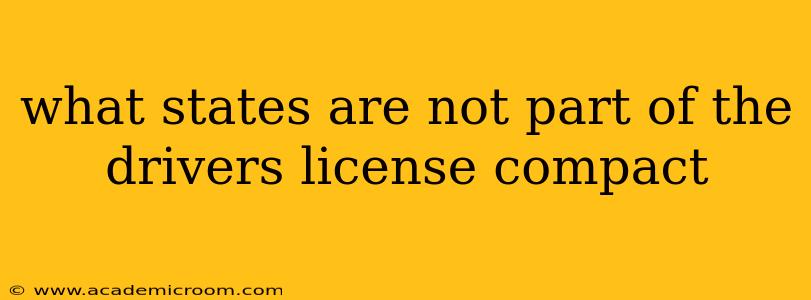What States Are Not Part of the Driver License Compact?
The Driver License Compact (DLC) is an agreement among states to share information about driver violations. While the vast majority of states participate, several remain outside the compact. Knowing which states aren't part of the DLC is crucial for drivers, especially those who frequently travel across state lines. Understanding the implications of this can help you avoid potential legal issues.
This article will identify the states that are not members of the Driver License Compact, explain what that means, and answer some frequently asked questions.
Which States Don't Participate in the Driver License Compact?
The states that are not currently part of the Driver License Compact are:
- Georgia
- Massachusetts
- Michigan
- New Hampshire
- New York
- Wisconsin
It's important to note that this list can change. While uncommon, states may choose to join or withdraw from the DLC over time. Always check with the official DLC website for the most up-to-date information.
What Does It Mean If a State Isn't Part of the Driver License Compact?
If a state isn't part of the DLC, it means that traffic violations incurred in that state generally won't automatically be reported to your home state's Department of Motor Vehicles (DMV). This doesn't mean you're exempt from consequences. You'll still be subject to penalties in the state where the violation occurred, including fines and potential court appearances. However, your driving record in your home state will remain unaffected unless the state in question chooses to report the violation directly.
This lack of automatic reporting can lead to potential issues. For example, if you accumulate multiple violations in a non-DLC state, your home state may remain unaware, and you might not face license suspension or other penalties in your home state even though your driving privileges should be affected.
Does This Mean I Can Get Away With Traffic Violations in Non-Compact States?
Absolutely not. While the DLC facilitates information sharing, the laws governing traffic violations are still enforced at the state level. Avoiding penalties in a non-DLC state is unlikely and carries significant legal risks, potentially including arrest and further charges. Always adhere to traffic laws, regardless of the state's participation in the DLC.
How Do I Find Out More About My State's Reciprocity Agreements?
Even if your state is a part of the Driver License Compact, it might still have individual reciprocity agreements with other states, or it might not have complete reciprocity. The best way to ensure you understand the ramifications of traffic violations in another state is to contact your home state's DMV directly. Their website often contains information on reciprocity agreements, and they can provide specific details regarding your licensing and driving record.
What Happens if I Get a Ticket in a Non-DLC State and My Home State is a Member?
If you receive a traffic citation in a state that isn't a member of the DLC and your home state is a member, the state where you received the ticket will handle the processing and penalties. However, depending on the severity of the violation, your home state may still learn of the violation through other means, potentially affecting your driving record. Contacting your home state's DMV after receiving a ticket is highly recommended in this situation.
This information is for general guidance only and should not be considered legal advice. For specific legal guidance on traffic violations and driver's licenses, consult with a legal professional. Always ensure you are following the laws of the state in which you are driving.
